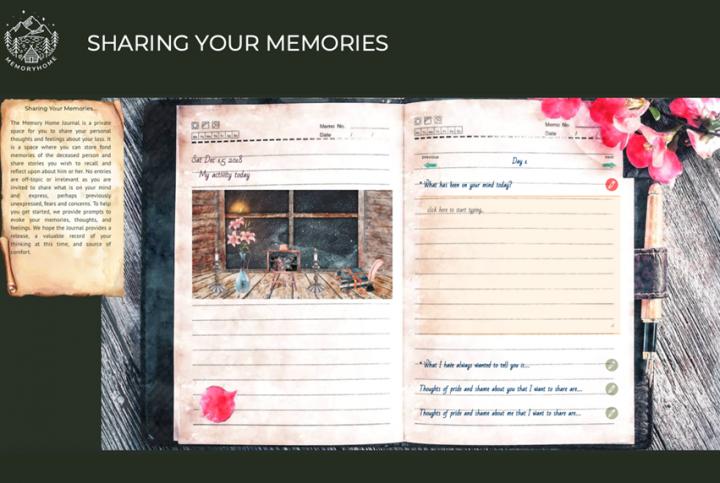
Credit: Living Memory Home
When a loved one dies, memories of that person become particularly valuable in connecting the mourners with the deceased. A new Weill Cornell Medicine online application, called Living Memory Home, offers a virtual and personal memorial space that allows mourners to deposit their memories and feelings about their loss and honor their loved one.
Living Memory Home users are able to create a memorial space that they can personalize with photos and messages. They can customize a virtual cabin and choose an appropriate view. The curated set of questions prompt users to write memories and feelings about their loved one. Users may write as if they are speaking to the person who died, which can help with the grieving process, said Dr. Wan Jou (Lavender) She, a postdoctoral research associate at Weill Cornell Medicine who co-designed Living Memory Home with researchers from the institution’s Center for Research on End-of-Life Care. The center is co-directed Dr. Holly Prigerson, the Irving Sherwood Wright Professor in Geriatrics II and professor of sociology in medicine at Weill Cornell Medicine.
“It could be stressful to always worry about forgetting the memories, so Living Memory Home serves an important function to allow them to deposit their memories,” Dr. She said.
Living Memory Home was developed in collaboration with Dr. Chee (Jim) Ang from the University of Kent’s School of Computing and Dr. Panote Siriaraya from the Kyoto Institute of Technology. Dr. Ang and Dr. Siriaraya played a role in providing insights into human computer interaction, particularly in relation to how users interact with technology in a social-technical context.
People who experience the loss of a loved one through death often report in research studies that their biggest fear is forgetting memories and details of that person. To that end, some people use social media as a forum to honor their loved one. However, the mechanism of receiving likes and comments on these forums often encourage people to act in a socially acceptable way and discourage the sharing of negative thoughts or taboo subjects, according to Dr. She.
While receiving likes or supportive comments on social media may feel gratifying, Dr. She said, mourners may self-edit the content and remove some details of the relationship, making the content superficial and less reflective of the complexity of the loss. However, grief involves revisiting the experiences and processing the variety of emotions, positive and negative, accompanied with the loss. Being unable to process grief appropriately could lead to prolonged grief disorder, which is when a person gets “stuck” in their grief, Dr. She added. They feel a persistent and pervasive longing for someone six months or more after the person has died, which can lead to a mistrust of others, feeling numb, substance use, suicidal thinking and other challenges.
To support the mourning process, Living Memory Home–which is free and available to the public– offers a virtual space in which people can memorialize and reminisce about their loved one privately, reflecting on both positive and negative memories and emotions.
To study design opportunities and challenges to facilitate backstage grieving, Dr. She and colleagues recruited 20 adults who had all lost a loved one within the past three years to use the Living Memory Home program for one month, later interviewing them about their experience with the program. The researchers presented their findings at CHI’21: ACM CHI Conference on Human Factors in Computing System, hosted May 8-13 in Yokohama, Japan.
“This study helps us understand how people use digital technology for sensitive and personal matters such as grieving, so that we can incorporate human values in technology design.” Dr. Ang said.
The center’s investigators developed Living Memory Home in response to the popularity of its self-screening Grief Intensity Scale, a free tool that assesses a person’s risk of developing prolonged grief disorder. The center’s researchers wanted to next create an application that could help people from reaching that state of prolonged grief disorder.
###
The work carried out in this paper is supported by an R21 National Institute of Mental Health research grant (MH121886) as well as an R35 National Cancer Institute research grant (CA197730).
Media Contact
Krystle Lopez
[email protected]
Original Source
https:/




